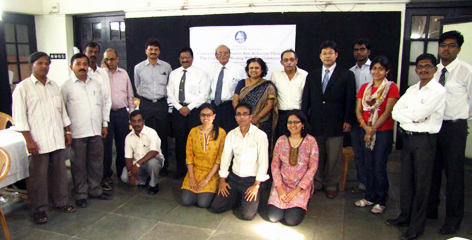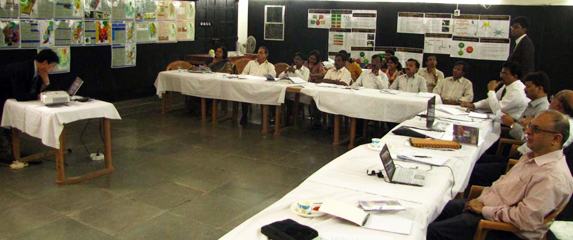Events
12 Community Based Disaster Risk Reduction Planning & Plan Making: "Working with the Community"
Date: December 3, 2011
Venue: Sir J.J. College of Architecture, 78/3 JJ College, Mumbai G.P.O (Fort), Mumbai, Maharashtra- 400001, India
Organized by:
Global COE Program “Global Center for Education and Research on Human Security Engineering for Asian Megacities”
Co-organized by:
- School of Planning and Architecture, New Delhi, India
- Municipal Corporation of Greater Mumbai (MCGM), Mumbai, India
- Sir J.J. College of Architecture, Mumbai, India. Tata Institute of Social Science, Mumbai
Number of attendants: 30
Report 193
Outline
The 5th workshop of the Global COE program, “Global Center for Education and Research on Human Security Engineering for Asian Megacities (GCOE-HSE)”, Mumbai base was held at Sir J.J. College of Architecture, Mumbai, India on January 21 & 22, 2011. The purposes of this workshop were to – a) Share experiences of the participating agencies and institutions in working in the field and with local communities particularly in the context of planning for disaster risk reduction ; b) Chart a road map focusing on procedures, methods and techniques and components to be included in the preparation of a community based disaster risk reduction plan ; c) Discussion on methods and processes that need to be followed to dovetail the community based disaster risk reduction plan with the local development plan of the MCGM.
Report
The workshop was opened by B. Misra, Senior Advisor & Coordinator, KU-GCOE Mumbai Project, Hirokazu Tatano, Leader, GCOE Mumbai, Kyoto University, Japan. In the welcome address Prof. B. Misra, Senior Advisor & Coordinator, GCOE Mumbai Project. thanked the collaborators, MCGM & SPA, and mentioned gratitude to Sir J.J. College of Architecture for co-hosting the workshop. Misra explained the GCOE Mumbai project (2009-2013), its purpose and objectives related to the implementation strategies of IDRiM in Asian Hotspot Megacity, Mumbai. The first phase of the project, ‘Knowing the Community’ was devoted to understand the community in the selected hot spots through intensive surveys and use of relevant secondary data and information. The second phase, ‘Working with Community” which is to begin now will be devoted to strengthening network with all stakeholders including the NGOs and the community representatives. The aim of the phase is to work together with community, field test and apply participatory technologies and prepare an integrated disaster risk management plan for a selected hot spot. Also explore methods by which the plan is best integrated with the local general development plan being made by MCGM. Prof. Tatano introduced the concept of Human Security Engineering. He talked of the overseas bases in Asia and their future research collaboration with Kyoto University. He simultaneously discussed the concept and action plan for Integrated Disaster Risk Management (IDRiM).
The participants in the workshop stressed on the growing concern over the increased vulnerability of Mumbai enhancing disaster risks. Community based initiatives for addressing social vulnerabilities and participatory approaches were the significant points discussed and it was noted that those remain weak and not effectively organized. Examples of other Asian cities were cited and successful disaster mitigation techniques were discussed for sharing views on good practices. Professionals from the field of Critical Infrastructure and other organizations discussed their visions on different techniques for community driven action plans in their respective fields. NGOs discussed their roles in the successful implementation of community based techniques in the identified hotspots. Almost 25 participants attended the workshop, bringing together not only university professors, but also a number of practicing professionals. A very significant achievement of the workshop was the participation of community members from the Parshi Chawl, Dharavi, which is one of the selected hotspot in Mumbai where the GCOE team would work with community. The participatory techniques namely ‘yomenkaigi’, ‘self efficiency’ & ‘collective efficiency’ were explained and discussed. The community representatives gave their views regarding their relevance and applicability to field realities. There was consensus that the techniques are useful and should be given the required field test with close participation of community people. The participation of the community people reflected a growing concern for Disaster Risk Reduction.
The workshop was mutually beneficial for GCOE-HSE and the representatives of the various organizations as well as the community people. It provided a common platform to share and exchange ideas between practitioners of different but related fields which eventually proved to be fruitful for the future of Mumbai.
The Workshop
The workshop was divided into the following session topics
1) Brief Report / Overview of GCOE-HSE Mumbai Base Activities
2) Sharing Experiences on Best Practices : “Working with the People”
3) Plan Making and Preparation of Risk Reduction Plan : Components and Tools
After the welcome speech, Dr. Samaddar briefly discussed about the major findings from the first and second round surveys which GCOE-HSE had conducted in the Mumbai micro hotspots. He also introduced the brief outcome of GCOE Mumbai organized Yonmenkaigi exercise in flood prone slum areas.
In the second session, Mr. Suresh of Mumbai Civil Defense threw light on the damages caused by 26th July Mumbai flood and the subsequent participatory mitigation measures initiated by Civil Defense post the disaster. He also had shown the outcome of the Yonmenkaigi workshop and local risk issues in the context of Rajiv Gandhi Nagar. Next speaker Nitin Sawant, Emergency Planner of Mumbai International Airport Authority,, has talked about various multi-stakeholders participatory approaches and training programs for rescue and evacuation operation in case of fire and terrorist emergency in Mumbai Airport. The third and last speaker of this session, Dayanand Jadav, General secretary of Triratna Prerana Mandal (NGO), Mumbai has shown a detailed and stepwise process of involving community in solid waste management. He has also introduced various innovative participatory initiations taken by their local organization at grassroots level.
The third session on the topic “Plan Making and Preparation of Risk Reduction Plan: Components and Tools” had two speakers. Kavas Kapadia, Professor & Dean of Studies, School of Planning & Architecture (SPA), explained the importance of systemic participatory approach to understanding social vulnerability in urban planning context. . Prof. Bhaduri , Professor & Head of the Urban Planning Department, School of Planning & Architecture (SPA), stressed on the need of Risk Sensitive Planning Process and possible strategies that could be adopted for Flood prone areas of Mumbai at the Greater Mumbai level, Mithi River Area Level and the Local Area Level. Prof. Kapil Gupta, Indian Institute of Technology Bombay, Mumbai focused upon in his presentation on Mumbai flood guidelines prepared by Municipal Corporation of Greater Mumbai and National Guidelines on Management of Urban Flooding by NDMA. He tried to infer how those guidelines had encouraged innovative and participatory risk mitigation approaches and technologies.


